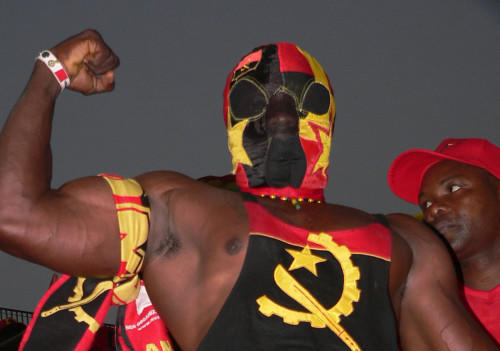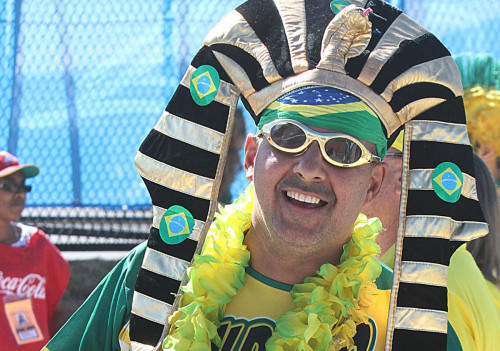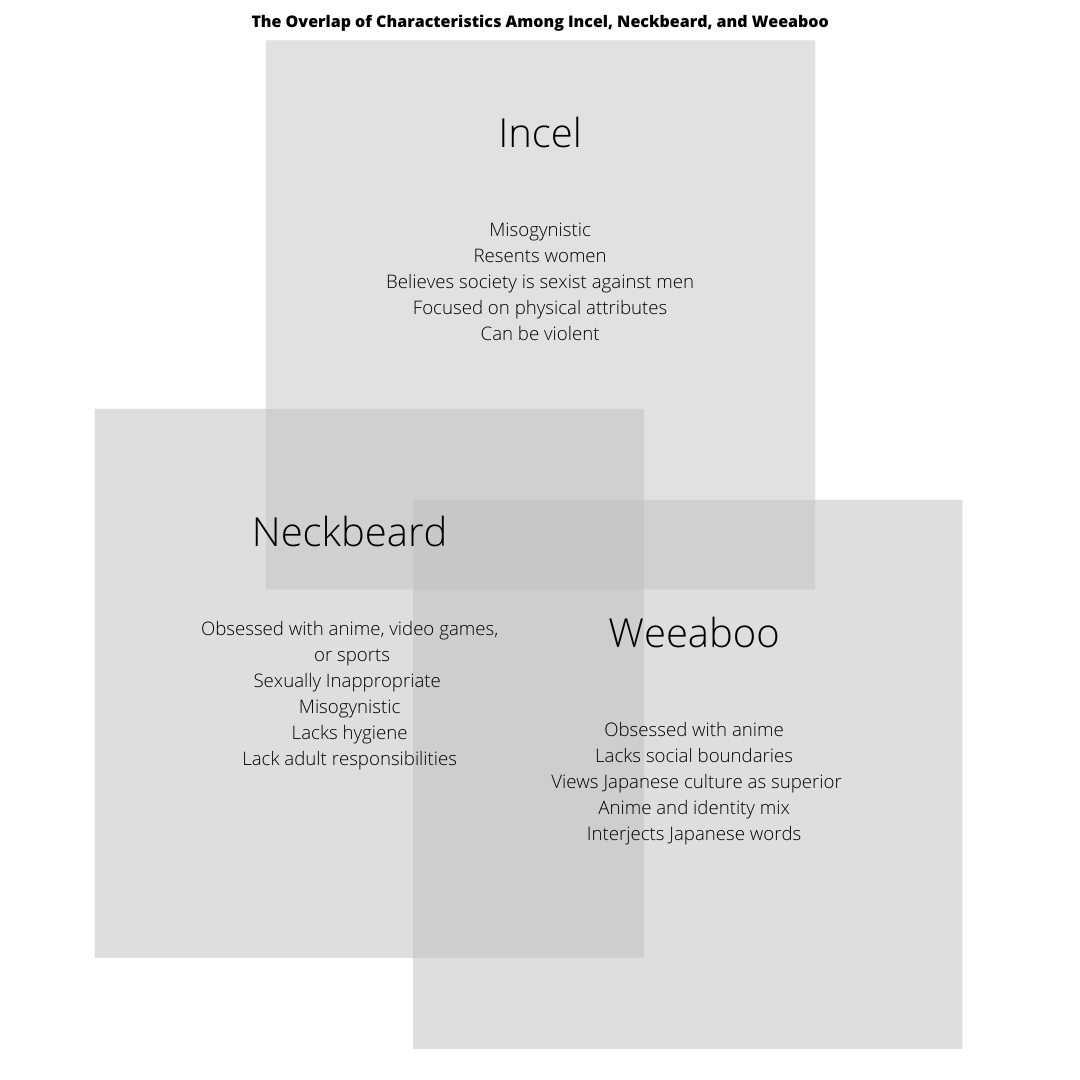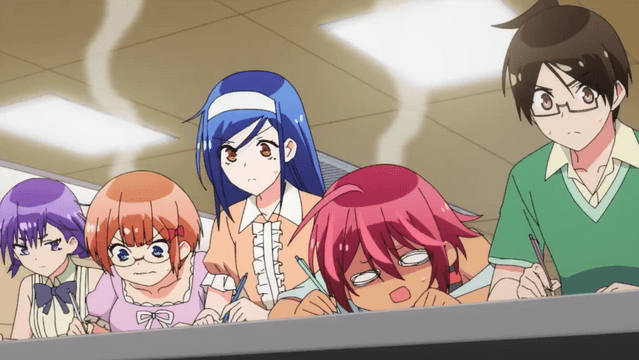Society thinks anime fans are uncool. Yet, that same society accepts the sportaku. A sportaku is better known as a sports fan. You know, the people who fill their houses with jerseys, blankets, and everything else stamped with their favorite team’s logo. Really is a sportaku any different from an otaku?

Nope. In fact, sportaku can be even more extreme.
Okay, we know otaku enjoy anime to the point of having their own lingo and enjoy collecting figures, DVDs, manga, and other anime merchandise. Anime is a part of an otaku’s identity. It shapes how she views the world. Anime is a channel for meeting people and being a part of the anime community lends a sense of belonging.
I don’t know about you, but that sounds awfully similar to being a sports fan. But I am going to take some time to build an argument to point out how silly it is for sportaku to be accepted while otaku are not.
Defining Otaku
The words geek and otaku often intermix. Geek is an American term that mostly refers to males who spend a lot of time with computers and video games. They are stereotyped as pale, disheveled, neck-bearded, and poorly dressed. They have few friends. Otaku in Japanese parlance share the same traits only they are obsessed with the information computers and media provide rather than the computers themselves. Otaku links with obsession, and many types exist: train-otaku, pop-idol-otaku and others. However, in Western use, otaku refers specifically to extreme anime fans. (Tobin, 2001). Weeaboo also substitutes for otaku.
While otaku is a negative word in Japan, in the West it has become a label embraced by anime fans. It still carries some stigma and negativity, just like the word geek. However, both geekdom and otakuism has become more acceptable and mainstream in recent years with comedies like Big Bang Theory and the prevalence of the cultures online.
Otaku culture involves community events like conventions, blogging, and other social outlets. It has become a common part of America’s public libraries. Most libraries have manga and anime now.
Many otaku collect manga, anime, figurines, and other memorabilia. They spend time writing about anime and drawing their favorite characters. Self-expression remains a part of the culture. Some write fan-fiction and draw their own comics.
Defining Sportaku
Now let’s take a look at a sportaku. The formal, academic definition of a sports fan is “an enthusiastic devotee of some particular sport consumptive object” (Yoshida, 2015). It’s a stuffy definition, but hang in there while I illustrate it. Let me throw out a few other definitions before we get started. They are important to understand what exactly a sport fan is and how he ultimately compares to an otaku.
Fan identification – “the degree to which the fan’s relationship with the team contributes to their social identity” (Peden, 2015).
Fan engagement – “escalating behavioral involvement that includes socially committed behaviors such as self expression, story-telling, and community participation.” (Yoshida, 2015).
Basically, a sportaku is a fan that is so into a sport or team that it becomes a part of who they are and how they act. A team victory feels like a personal victory. A fan also feels a strong sense of comradery with other fans of their team. How many times have you seen complete strangers high-five, hug, and celebrate together when their team wins? I am not a sports person, but I’ve seen it happen frequently. The shared engagement and identity transcends normal boundaries between strangers. They share feelings of elation, enthusiasm, and other emotions. This shared connection and collective feeding of emotion feeds the hooliganism we see when a sports team wins. The elements that define a fan also create victory riots.

Speaking of motivating factors, researchers created models that help explain sportakus. People watch sports for various reasons and to differing degrees. Spectators are people who follow a team casually and are not affected by a team’s victory or loss (Peden, 2015). People are rated based on their engagement and identification levels up to the ranks of the dysfunctional fan and fanatic (Yoshida, 2015; Sveinson, 2015). A sportaku is someone who lives in these extreme levels.
Sports, like anime, motivates people based on how much they identify with it. Fanatics have different motivating factors –self-esteem, group affiliation, knowledge, and social interaction–than spectators–entertainment, social interaction, and stress reduction (Sveinson, 2015). Like anime fandom, emotion underpins sports fandom. In fact, the effect of sports on people is as strong as religion (Cottingham, 2012).
Illustrating Sportakuism
It is common to see sport fans wearing hats, sweaters, jerseys, and other symbols of their team loyalty. Sport fans rank themselves based on their dedication and knowledge about their teams. Fans can be authentic or inauthentic, and women are often seen as less authentic than men (Sveinson, 2015). Wearing team logos is an outward sign of being a part of the “in” crowd. Identity is defined by what a person is not more than who a person is. I am a Steelers fan. I am a Browns fan or a Yankee fan. Those statements exclude other teams. It creates boundaries, and those boundaries define identity.
Sportaku wrap their identity with these boundaries. Fandom becomes so much a part of an extreme fan’s life that it blends with family, religion, education, and other ways that become inseparable from the person (Cottingham. 2012). Let me use Cottingham’s illustration to drive home the point:
Steelers solidarity is illustrated in the story of a woman who, at the final request of her late husband, brought his ashes to a Steelers game at Heinz Field. Her husband never attended a game in his lifetime and was, therefore, unable to experience peak moments of interaction rituals, but he had been a devoted fan even from his home in New England. His sons dressed in Steelers jerseys for his funeral and his body was covered with a Steelers blanket.
Okay, let me throw one final definition at you before we compare the sportaku to the otaku.
Sportaku (noun) – a person for whom a sport or sports team is an integral part of their identity, defining their social life, self-esteem, and self expression.
The Sportaku Versus the Otaku
Phew, with that muddle out of the way, let’s get to comparing the otaku to the sportaku. We will also look at how silly it is for society to favor the sportaku over the otaku.
 The otaku is an extreme fan of anime, one that derives their sense of identity from being a part of the anime community. Like sport fans, the otaku consumes products related to their interests. Both wjll spend a lot of money on memorabilia. Where sportaku will meet in bars, anime fans will meet in conventions. Both like to gather around the TV. Anime lends the same emotional motivators as sports: social interaction, entertainment, group affiliation, self-esteem, and knowledge. Also like sport fans, anime fans organize themselves based on their level of knowledge and loyalty. Otaku have particular series, characters, and authors they identify with. Just as sport fans have particular teams or type of sport.
The otaku is an extreme fan of anime, one that derives their sense of identity from being a part of the anime community. Like sport fans, the otaku consumes products related to their interests. Both wjll spend a lot of money on memorabilia. Where sportaku will meet in bars, anime fans will meet in conventions. Both like to gather around the TV. Anime lends the same emotional motivators as sports: social interaction, entertainment, group affiliation, self-esteem, and knowledge. Also like sport fans, anime fans organize themselves based on their level of knowledge and loyalty. Otaku have particular series, characters, and authors they identify with. Just as sport fans have particular teams or type of sport.
The importance of the sport or anime to a fan’s identity defines the otaku and sportaku. The team, the waifu, becomes as much a part of a person as they eye-color. Anime and sports can consume the majority of the fan’s free time. Anything you spend a lot of time consuming will shape your perspective. The messages of competition, sportsmanship, violence, loyalty, misogyny, and other positive/negative ideas naturally become a part of your world view. Anime as a storytelling medium conveys messages more directly than sports, but sports do the same within their cultures.
When it comes to women, it’s a mixed bag. Sportaku and otaku tend to have sexist tendencies within their cultures. Both remain boys’ clubs in many ways, but this is changing. Female athletes become stars. Anime in the West features more strong female protagonists. Neither sports nor anime are inherently sexist, but they have their moments.
Sportaku–not all–will sometimes trash a city block as they celebrate. Otaku–again, not all–will start flame wars about a particular anime. Sportakuism can form cult-of-personalities around certain players. Otaku do the same around some characters and Japanese pop idols.
Considering all of this, why is it that society favors sportakuism? Well, sport franchises have far more money and power than anime studios. Mostly, it is because of cultural concerns. American culture embraces sports as a representation of American values: personal achievement and competition. Sports touch on feelings of nationalism and belonging. Anime doesn’t. Think of the World Cup. Teams represent their home countries and compete to show who is the best. Victories and losses feel like personal victories and losses. Sports offer a story that resonates and is easily understood. Anime stories can be a muddle. Anime is also a cultural import while most popular sports (American football and baseball) are domestic creations. Anime also suffers from its association with cartoons. Cartoons are seen as the realm of children. Basically, anime won’t ever gain the widespread acceptance sports enjoy.
But is that necessarily a bad thing?
Like sport fandom, anime fandom has degrees of dedication. Sport fandom lasts through most of life and into death. Many anime fans age out of the fandom. Why? Because over time anime stops fulfilling the emotional and social needs it once did.
Sportakuism and otakuism are identical. Whenever a sportaku makes fun of you for your interest in anime, keep this in mind. You share more in common than the sportaku will believe.
References
Cottingham, M. (2012) Interaction Ritual Theory and Sport Fans: Emotion, Symbols, and Solidarity. Sociology of Sport Journal, 29 168-185.
Peden, C., Paula Upright, et al. (2015) Fan Identification in Sports: Assessing Fan Motives for Supporting a Sports Organization. KAHPERD Journal. 52 (2). 37-41.
Sveinson, K. & Hoeber, L. (2015) Overlooking the obvious: an exploration of what it means to be a sport fan from a female perspective, Leisure Studies, 34:4, 405-419, DOI: 10.1080/02614367.2014.923496.
Tobin, J.. (2001). Save the Geeks. Journal of Adolescent & Adult Literacy, 44(6), 504–508.
Yoshida, M., et al. (2015) Fan Community Identification: An Empirical Examination of its Outcomes in Japanese Professional Sport. Sport Marketing Quarterly. 24. 105-119.






You’d be surprised that there are people that quit being sports fans because you achieve a different kind of burn out — a sports burnout. You could simply tire of getting so attached to your team, or be disgusted at how the sport has evolved, that you give up. I know a few people that has happened to, and that includes my dad, who was very much into college basketball, but not so much anymore. So it can last from a good 20 years to only 5. It depends.
That’s interesting. I have family members that burned out on individual teams, like the Cleveland Browns, but not the sport. It makes sense for a long time fan to become frustrated with problems.